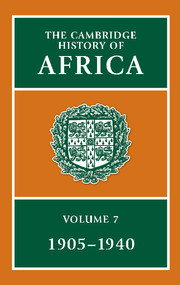Book contents
- Frontmatter
- Introduction
- 1 The imperial mind
- 2 Aspects of economic history
- 3 Christianity
- 4 Islam
- 5 African cross-currents
- 6 The Maghrib
- 7 French black Africa
- 8 British West Africa and Liberia
- 9 Belgian Africa
- 10 Portuguese Africa
- 11 Southern Africa
- 12 British Central Africa
- 13 East Africa
- 14 Ethiopia and the Horn
- 15 Egypt and the Anglo-Egyptian Sudan
- Bibliographical Essays
- Bibliography
- Index
- 10 West Africa from Senegal to Dahomey, 1935
- 13 Belgian Africa, 1939
- References
5 - African cross-currents
Published online by Cambridge University Press: 28 March 2008
- Frontmatter
- Introduction
- 1 The imperial mind
- 2 Aspects of economic history
- 3 Christianity
- 4 Islam
- 5 African cross-currents
- 6 The Maghrib
- 7 French black Africa
- 8 British West Africa and Liberia
- 9 Belgian Africa
- 10 Portuguese Africa
- 11 Southern Africa
- 12 British Central Africa
- 13 East Africa
- 14 Ethiopia and the Horn
- 15 Egypt and the Anglo-Egyptian Sudan
- Bibliographical Essays
- Bibliography
- Index
- 10 West Africa from Senegal to Dahomey, 1935
- 13 Belgian Africa, 1939
- References
Summary
This chapter is concerned with the circulation of ideas among Africans south of the Sahara, and in particular those ideas which travelled across the frontiers by which the succeeding regional chapters are circumscribed. Growing awareness of belonging to a particular colonial territory was one very important feature of our period, but the units of colonial government were by no means the only new frames for social action. They overlapped with spheres of economic pressure and religious affiliation which also created new routes for travel and new occasions for the exchange of ideas. These routes led Africans from one part of the continent to another, and for a tiny but most important group they also led overseas, to Europe and the USA. As their social horizons expanded, Africans refined their comprehension of the colonial condition and reflected on their multiplying social identities: as blacks, as Africans, as colonial subjects; as workers, soldiers, students or professional men; as Christians or Muslims; as members of tribes and as potential citizens of future nation–states.
This process had of course begun well before 1900. The great expansion of trade in much of sub-Saharan Africa during the nineteenth century had caused free Africans to move further from nome than ever before. Caravan routes were extended or created. The old networks across the Sahara linked up with routes across the length and breadth of West Africa. South of the equator, raiders pushed into the interior from both east and west coasts; the great lakes, and the rivers of the middle Zaire basin, became important highways. This greatly accelerated the interchange of information, customs and beliefs between African peoples. Languages were learned, and some, such as Hausa, Swahili or Lingala, became lingua francas.
- Type
- Chapter
- Information
- The Cambridge History of Africa , pp. 223 - 266Publisher: Cambridge University PressPrint publication year: 1986

